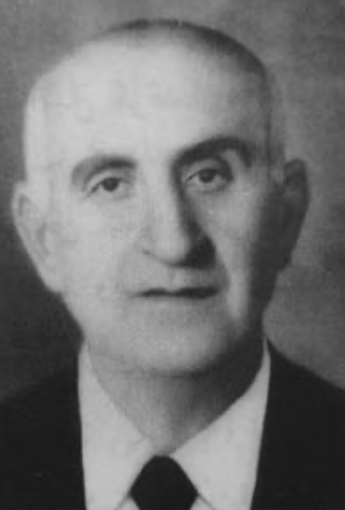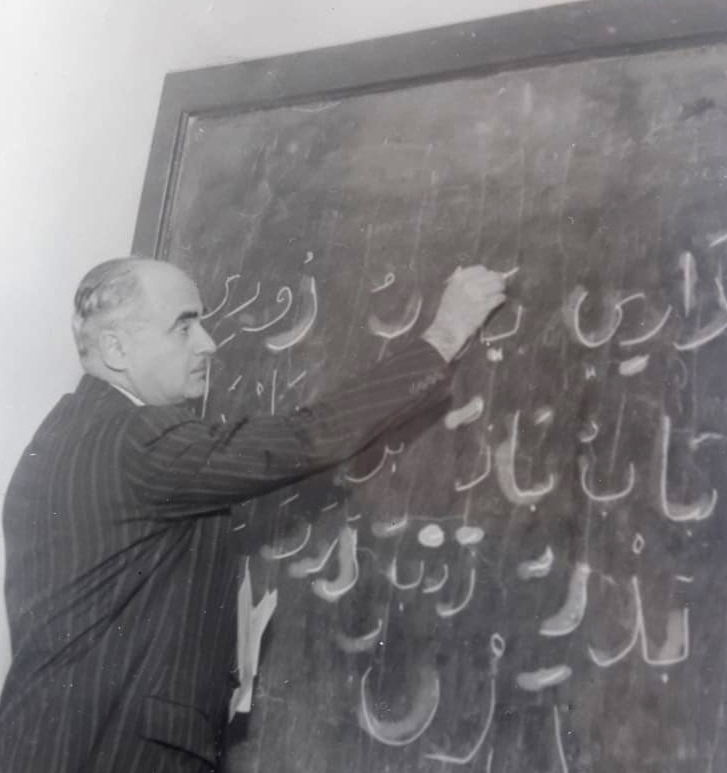By Francesco Medici
all rights reserved. © Copyright Francesco Medici 2024
The Arabist, writer and historian José Elias Guraieb (Yūsuf Ilyās al-Ġurayyib, 1894–1980) was born in Bāniyyās, Syria, to a Lebanese father and a Syrian mother. After graduating in Arab language and literature, in 1914, he joined some of his family who had emigrated to Tucumán, Argentina. There, he, who already mastered Turkish, English, French, and Syriac, soon learned Spanish and founded «Sūriyā al-Fatāh», also known as «Siria la Joven» (The Young Syria), a bilingual magazine in Spanish and Arabic, where he began to publish his poems and his first translations.
After a few years, he moved first to Villa Quinteros, then to Córdoba, where he settled permanently and worked as a professor of Arabic at the National University of the same town, in a chair created within the framework of a cultural agreement between Lebanon and Argentina.

 His connection with Gibran was due to his uncle Amin Guraieb (Amīn al-Ġurayyib, 1880–1971), who had founded in 1903 in New York the Arabic newspaper «al-Muhāǧir» («al-Mohajer», meaning “The Emigrant”) and had been the publisher of the first three Gibran’s books: Nubḏah fī Fann al-Mūsīqá (A Short Treatise on the Art of Music),[1] ‘Arā’is al-Murūǧ (Brides of the Meadows),[2] and al-Arwāḥ al-Mutamarridah (Spirits Rebellious).[3]
His connection with Gibran was due to his uncle Amin Guraieb (Amīn al-Ġurayyib, 1880–1971), who had founded in 1903 in New York the Arabic newspaper «al-Muhāǧir» («al-Mohajer», meaning “The Emigrant”) and had been the publisher of the first three Gibran’s books: Nubḏah fī Fann al-Mūsīqá (A Short Treatise on the Art of Music),[1] ‘Arā’is al-Murūǧ (Brides of the Meadows),[2] and al-Arwāḥ al-Mutamarridah (Spirits Rebellious).[3]
Through his uncle Amin, José Guraieb could request and obtain Gibran’s permission to translate his works from the original Arabic and English into Spanish, a task he carried out over the years. In the space of half a century, he translated and published: Analectas (selections from The Madman, The Forerunner and Dam‘ah wa Ibtisāmah),[4] El Profeta (The Prophet),[5] Jesús, el Hijo del Hombre (Jesus The Son of Man),[6] El jardín del Profeta (The Garden of the Prophet),[7] Espuma y arena (Sand and Foam),[8] Los dioses de la Tierra (The Earth Gods),[9] Al Mawakib (al-Mawākib, meaning, ‘The Processions’),[10] the anthology Poemas y parabolas (Poems and Parables).[11]
He also edited and translated the collection Sabiduría árabe (Arab Wisdom), accompanied by reproductions of some drawings by Gibran.[12]
* This article is based on an excerpt from the paper: F. Medici, Muhāǧirūn wa Mutarǧimūn: Early Arab Authors of the Diaspora as Translators and Self-Translators, «Letters from Byblos», No. 28, Byblos: 2024, pp. 13-57.
[1] Ǧubrān Ḫalīl Ǧubrān, Nubḏah fī Fann al-Mūsīqá, New York: Maṭbaʻat Ǧarīdat al-Muhāǧir, 1905.
[2] Ǧubrān Ḫalīl Ǧubrān, ‘Arā’is al-Murūǧ, New York: Maṭbaʻat Ǧarīdat al-Muhāǧir, 1906 (cf. Kahlil Gibran, Nymphs of the Valley, Translated from the Arabic by H.M. Nahmad, New York: Knopf, 1948).
[3] Ǧubrān Ḫalīl Ǧubrān, al-Arwāḥ al-Mutamarridah, Maṭbaʻat Ǧarīdat al-Muhāǧir, New York 1908 (cf. Kahlil Gibran, Spirits Rebellious, Translated from the Arabic and with an Introduction by H.M. Nahmad, New York: Knopf, 1948).
[4] Gibran Khalil Gibran, Analectas, Buenos Aires: Imprenta Mercatali, 1928.
[5] Gibran Khalil Gibran, El Profeta, Traducción de José E. Guraieb. Nota preliminar y biográfica por el traductor seguida de unos juicios críticos sobre el autor, Buenos Aires: Talleres Gráficos Argentinos L. J. Rosso, 1933.
[6] Gibran Khalil Gibran, Jesús, el Hijo del Hombre, Córdoba: Vicente Rossi, 1937.
[7] Gibran Khalil Gibran, El jardín del Profeta, Córdoba: A.N. Pereyra, 1943; El Profeta y su Jardín, Córdoba: Universidad Nacional de Córdoba, 1958 (cf. Kahlil Gibran, The Garden of the Prophet, New York: Knopf, 1933).
[8] Gibran Khalil Gibran, Espuma y arena, Córdoba: Vicente Rossi, 1946.
[9] Gibran Khalil Gibran, Los dioses de la Tierra, Buenos Aires: Kier, 1970.
[10] Gibran Khalil Gibran, Al Mawakib, Córdoba: Saipe, 1971 (cf. Ǧubrān Ḫalīl Ǧubrān, al-Mawākib, New York: Maṭbaʻat Mir’āt al-Ġarb al-yawmiyyah, 1919; Kahlil Gibran, The Procession, Edited and Translated by George Kheirallah, New York: Philosophical Library. 1958).
[11] Gibran Khalil Gibran, Poemas y parabolas, Buenos Aires: Kier, 1978.
[12] José E. Guraieb, Sabiduría árabe, Con reproducciones de dibujos de Gibran Khalil Gibran, Buenos Aires: Peuser, 1949.